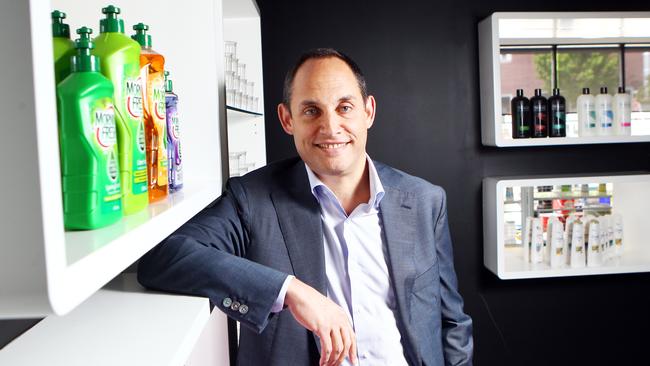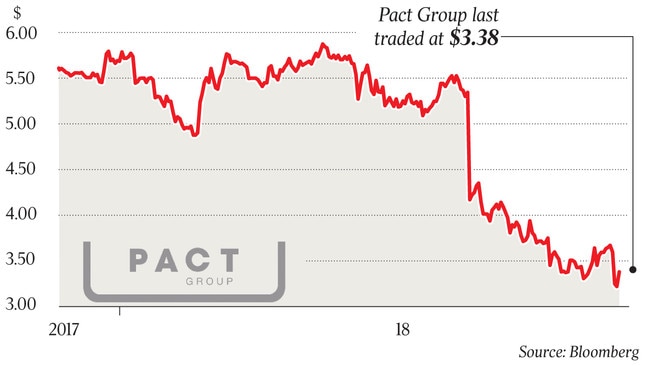Asia beckons as costs send Pact packing
The nation’s largest manufacturer of rigid plastic packaging, Pact Group, says it will move more of its operations to Asia.

The nation’s largest manufacturer of rigid plastic packaging, billionaire Raphael Geminder’s Pact Group, says it will move more of its operations offshore to Asia because of the soaring cost of doing business in Australia.
Pact has closed three local manufacturing sites over the past 12 months among more than 60 it runs in Australia, New Zealand, Asia and the US after undertaking extensive work on establishing a reliable and cost-effective import supply chain for select product categories.
Pact, which has more than 4000 staff, supplies a wide range of plastic and steel packaging to the food, household cleaning, pharmaceutical, personal care, agricultural, chemical and industrial markets.
Mr Geminder said the company’s Asian platform and the many years of experience operating in the region were critical in helping Pact decide to make more product offshore, but he also blamed the soaring cost of manufacturing locally.
“We are (making more product overseas) and we will continue. We have no choice. If you look at the five variables a manufacturer has to think about — raw materials, power, rent, infrastructure and people costs — when you look at all those elements, unless you have things that are not freight-friendly, it is hard to compete with Asia. Fortunately, we have spent 10 years building an Asian footprint and that now gives us the latitude and the ability to use that infrastructure and footprint to grow out manufacturing in Asia,’’ Mr Geminder said in an interview with The Australian.
Asked if he would move more manufacturing offshore, he replied: “I don’t think we will have a choice.”
“We need to think about what we want as a country. I think right now, I am not sure that emotionally we don’t want manufacturing, but our actions are leading us to a position where there will be less and less manufacturing. You can’t deny that.”
But Mr Geminder said he was still focused on trying to help policymakers build a sustainable manufacturing environment for the country.

“To do that we need a lot of things to improve. The leadership of the country, whether Liberal or Labor, needs to think very hard about how we make sure that we put in place a framework that allows companies to be competitive and remain manufacturing in Australia. If they don’t have that framework, then we will lose more manufacturing long-term and structurally that will be bad for the country,’’ he said.
His comments come after Pact shares plunged by more than 15 per cent at one point on Wednesday after the company downgraded its 2019 profit guidance, three months after a worse-than-expected annual result that led to the departure of chief executive Malcolm Bundey.
Pact shares closed on Friday at $3.38, well below their issue price of $3.80 in the company’s 2013 float, and they have fallen more than 40 per cent in the past three months.
The latest downgrade was blamed on lags in recovering higher than anticipated resin costs — a key raw material in plastic — and higher charges for contract manufacturing materials.
But the company has been criticised for becoming too focused on acquisition-led growth and questions have been raised by investors over its ability to successfully integrate recently acquired businesses into the company fold.
The manufacturer’s second-largest shareholder, the $9 billion Investors Mutual’s Anton Tagliaferro — who has previously written to the Pact board questioning the company’s performance — said Australian manufacturers faced a gloomy outlook given slipshod government policy and higher energy prices than many of its global competitors.
“All of manufacturing in Australia is feeling the pinch of failed government policies and that includes electricity,” Mr Tagliaferro told The Australian. “Manufacturers are seeing their costs going up, their margins being squeezed and they’re grappling with having to put their prices up to customers,” he said.
“It’s a diabolical situation where the price of electricity in Australia is three times what it is in the US. Unfortunately we’re living in this crazy environment where we sell coal, uranium and gas to everyone else in the world but it doesn’t seem like we are able to effectively use it here for our own needs.”
More broadly, he said a decade of ineffective government policies had put a handbrake on the ability of Australian business to succeed.
“Unfortunately, eventually the country is going to have to pay the price for this poor management.”
Mr Tagliaferro said there may be a pick-up under a Bill Shorten-led Labor government.
“At the moment I don’t think things could be any worse. We basically have a government that’s basically running the country by opinion poll and every week the policies change depending on what the polls say. What we need is some certainty,” he said. The impact of ineffectual policy had added to the pain of sharemarket investors reeling from weeks of volatility, he said.
“Not only have they got volatility and uncertainty from overseas obviously, but clearly when you look at the Australian sharemarket and you look at the impact of the NBN on telcos, the utility sector where there is huge uncertainty as to who will be able to make money, or will the government tell you what you have to charge,” said the veteran fund manager.
“Then you have the banks, pulled over the coals at the royal commission, then the government giving $2bn because they want to lend to the small business sector because they’re worried about credit freezing. Policy has become diabolical. There is no vision, no leadership and hopefully whoever gets into power next year can give this country the direction and leadership it deserves.” In the manufacturing sector, Amcor revealed in August that sharper than expected increases in the price of the raw materials it uses to make plastic packaging for food, drinks and cigarettes had wiped about $58 million from its annual profits.
Manufacturing Australia chairman James Fazzino has previously claimed high costs and declining energy security were materially damaging the ability of local manufacturers to compete against imports, impacting both potential and current manufacturing investments.
He claimed the business case for undertaking essential reinvestments and plant maintenance in many existing manufacturing operations was increasingly being scrutinised by boards and executive teams and that plant closures and job losses flowing from high energy costs were inevitable.
The Australian Industry Group’s Performance of Manufacturing Index, which measures perceived changes in activity levels across Australia’s manufacturing sector, was at 58.3 in October after seasonal adjustments. Anything above 50 signals that activity levels are improving. The levels have now improved for 25 consecutive months, the longest stretch of continuous growth since 2005.
But chief executive of the Australian Industry Group, Innes Willox, said recently that challenges remained for the sector.
“While manufacturers are working hard to sustain these robust conditions, the uncertainties hanging over energy prices and energy policy continue to cloud the medium and longer-term outlook, particularly for the more energy-intensive segments of the industry,” he said.
“The economic uncertainty is also impacted by drought, global trade disputes, the fluctuating dollar, declining consumer sentiment, fallout from the royal commission on lending and the looming federal election.”
Mr Geminder agreed consumers and top-line company revenues were under pressure.
“I actually think our result is pretty good and that we are punching above our weight,’’ he said.



To join the conversation, please log in. Don't have an account? Register
Join the conversation, you are commenting as Logout